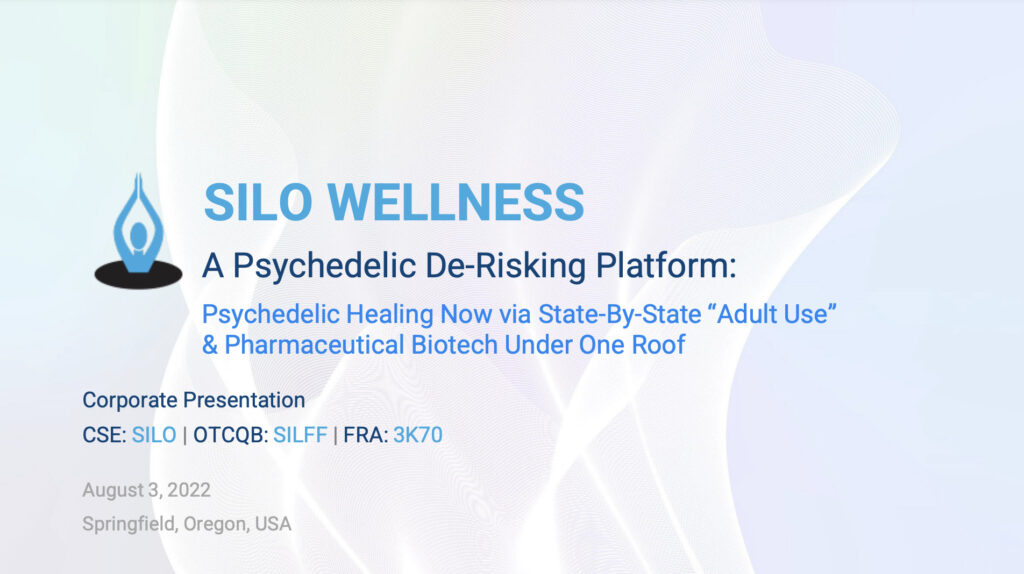Helping humanity heal
Be a part of something big, something bigger than all of us. Silo Wellness is in the business of healing and transformation through the assistance of guided psilocybin mushroom retreats.
The movement to a better world for all starts right here, right now.
Investor FAQ
How to Buy Silo Wellness Stock – OTC: SILFF | CSE: SILO
If you are in the United States or otherwise have access to OTC stocks, use the SILFF symbol.
If you are in Canada, Silo Wellness is listed on the Canadian Securities Exchange (CSE) and trades under the SILO symbol.
In the UK or Europe, we are listed on the Frankfurt Stock Exchange as 3K7A.
If you are in the United States and use the SILO OTC symbol, you will be buying the former athletic apparel company now known as Silo Pharma. That is not us.
If you have any questions, please contact Investor Relations at ir@silowellness.com, or by phone at 902.818.8807.
Step 1: Open a brokerage account. We know that SILFF is available on E*TRADE , Ameritrade, and several others. Robinhood doesn’t show OTC stocks. We are not recommending any particular investment account or service but are just communicating what we have observed.
Step 2: Fund your account.
This actually takes the most time. You can open an account relatively quickly but you need to fund it from a checking account. Only after that clears can you initiate an order.
Step 3: Place your “BUY” order.
“Price type”: Typically you choose “limit” rather than “market at close.” Often times the trade won’t close if the latter selection occurs.
For questions, call the help desk at the brokerage service (i.e., 1-800-ETRADE-1 (1-800-387-2331)) or Silo Wellness’s investor relations.
STEP 4: Follow up on your investment account and confirm that the sale has closed. If there are problems, call customer service or Silo Wellness IR.
If you have any questions, please contact Investor Relations at ir@silowellness.com, or by phone at 902.818.8807.
Yes! Reach out to retreats@silowellness.com once you are a shareholder and we’ll provide you with a discount code.
Silo Wellness’s financial statements and other corporate documents can be found on the CSE website or on SEDAR, the mandatory, electronic document filing and retrieval system that allows listed Canadian public companies to report their securities-related information with Canada’s securities regulation authorities.
Please do not hesitate to contact investor relations to walk you through the documents and answer any questions at ir@silowellness.com, or by phone at 902.818.8807.
Contact Investor Relations at ir@silowellness.com, or by phone at 902.818.8807.
There are no plans for a brick-and-mortar store in Jamaica. Mushrooms have commoditized on the island and now they are ubiquitous. They are just another crop and/or product or ingredient. Psilocybin mushrooms can be found in high-end luxury resort shops, in rural one-room shanty stores, on various street corners, and in ganja dispensaries.
A physical shop in Jamaica could be the epicenter of information and products in Jamaica and wonderful educational outreach to the investor world and potential consumers. It could even be used for booking psilocybin sessions. However, it is the opinion of management that anything that requires a physical footprint would best be accomplished through a collaboration with an existing operator rather than assuming the capital and operational risk.
A physical store could be an amazing opportunity to connect with a global audience. However, with the state of the capital markets and from observing the development of the psychedelic space, Silo Wellness reassessed capital expenditures and has attempted to rework the company structure to minimize capital needs by leveraging relationships that minimize risk.
Silo Wellness was founded in 2018 in Oregon with the intent of being a leader in Oregon. We are laser focused on Oregon.
Jamaica was the proof of concept. While mushrooms cannot be exported to Oregon, our people, processes and procedures can be. Then, the company intends to move on to new molecules and jurisdictions as the opportunities arise, i.e., Colorado psilocybin, Jamaica 5-MeO-DMT, etc.
Here’s more regarding from our MD&A: On June 2, 2021, the Company announced that it signed a binding letter of intent with Canadian-based mushroom company Mushe Inc. (“Mushe”) to establish the first legal functional and psychedelic mushroom retail outlet in the Western Hemisphere, based in Jamaica.
The Company has intended to operate a “smart shop” retail establishment specializing in the sale of functional and psychoactive mushroom products such as tinctures, capsules, topicals and edibles, as well as boutique literature and accessories.
The Company identified and secured a retail location in Ocho Rios near a busy cruise ship port. The lessor had agreed to defer through November 2021. Given the recent uptick in cruise ship traffic and the expected volume for the foreseeable future, the Company anticipated moving the store buildout forward and to have the store open by the end of May 2022 if additional capital was raised or sales goals were achieved giving the Company the financial capacity to proceed. While additional capital was raised, as mentioned in the previous MD&A, the Company reevaluated the propriety of such expenditures for a physical location and discontinued this effort, instead focusing efforts on increasing retreat services and preparing for Oregon.
In Jamaica, we neither own nor lease the space. As mentioned in previous MD&A’s, the Company uses agreements with third-party resorts. These agreements are non-material.
Booking locations as we went initially allowed the Company to build out the business model without having the capital risk associated with purchasing, running and operating a resort. By not leasing the resorts, we do not take on the risk of vacancies.
This booking model was very efficient during COVID when the supply of vacancies far exceeded demand for Jamaica resorts. However, with the rise of digital nomadism and increased tourism abroad, quality locations with the proper setting for psychedelics are rarer. Additionally, the previous model still had risk by booking an entire resort; if bookings don’t meet the breakeven threshold, then a retreat could be operated at a loss.
This is a great deal for the resort but not so much for the Company. Yes, we get some economies of scale through discounts by booking an entire resort or block of rooms. However, those aren’t the sort of collaborators we are looking for in the space. We are looking for friends and partners, not looking to be someone’s customer. The resorts received all of the publicity of being associated with their customer (Silo) in a cutting-edge sector and thus received all of the earned media coverage that being a pubco leverages. They also received the other marketing with none of the risk. Then, the resort could turn around and market their resort to other psychedelic operators who would come to them thanks to us raising their profile. Exclusivity was not negotiated by previous leadership, nor was it even likely to be granted without considerable financial commitments by us given our smaller scale at that time. Essentially the Company was a glorified booking/marketing agency for the resorts with none of the risks shared by the resorts.
Consequently, since June 2022, under the new Silo Wellness leadership, the Company embarked to leverage relationships on the island to minimize risk by collaborating with other operators.
On August 22, 2022, the Company announced the first of those collaborations involving Go Natural Jamaica. In that collaboration we book as we go with the risk shared by the operator. This is a fair deal for the resort in that they get the momentum of the psilocybin industry with the Silo Wellness psychedelic brand that invokes trust and safety. And they can still fill up their resorts with non-psychedelic customers when we are not hosting and thus do not have to share that revenue with us.
There are two things that clients are looking for when booking a retreat: cost and safety. They are afraid that they might break their brain. That’s a horrible mindset to have when trying psychedelics for the first time. Most people are coming to fight fear (fear of the future and fear of what happens due to the regrets of the past), so introducing a new form of fear due to the medicine itself or the providers of the medicine is not necessarily helpful.
We mitigate that fear by focusing on client safety. Clients come to us knowing that we have the intake team, protocols, and procedures in place to keep them safe.
Clients also know that we are a US and Canada-based company and not some fly-by-night foreign operator. They have read the reviews and testimonials and the third-party validation from independent journalists (Outside Magazine, Bloomberg, Forbes, Fodor’s Travel, Men’s Health, Washington Post, CNN, etc.). There’s also the feeling of safety for booking with a Company that has the regulations and transparence that surround a publicly traded company. That’s another layer of trust. They know that the buck stops somewhere.
We market, intake, prepare clients, administer the medicine, risk mitigate the ceremonies, and integrate clients. The resort operators do what they do best: run the hospitality side of resort accommodations (transportation to/from the airport, lodging, food, etc.).
This of course is all a short-term model. As we grow, this model scales just like the hotel industry. If someone wants to book a stay anywhere in the world, they can always trust a minimum level of care by booking with someone like Hilton. The brand invokes trust. The brand is also great for operators and property owners that Hilton contracts with. They don’t necessarily have to own the dirt or the hotel or run the operations. However, they can if it pencils out; for instance, they can include purchase options and rights of first refusal. They can buy one property stick at a time without having to buy the whole bundle.The local entrepreneurs and property owners can focus on the on-site client care and get the economies of scale that come with booking, protocols, procedures, etc.
So that begs the question: If this is potentially a hotel-type model, then why isn’t Hilton branding psychedelic retreats? Because it’s federally illegal in the United State and traditional banks can’t touch the space. This means capital is scarce and this is why that the psychedelic industry, and the cannabis industry before it, were funded by speculative private investors. They get the greater potential returns that come with a successful revenue-generating business that banks can’t finance, but they can bail at any time by due to having invested in a public stock which may slightly cover their downside if they are good at predicting the future.
The long-term vision of Silo Wellness is to scale and enter markets one molecule and one jurisdiction at a time. The bigger you are, the easier it is to negotiate favorable contracts. We started out with one person with a dream and a vision. That led to relationships with others who share the vision. That led to collaborations. This vision led to revenue. Competition leads to slim margins. New collaborators may see the upside with a recognized and experienced brand and terms may get better over time; and the cycle continues. The more you can offer a property owner or operator, the better the terms get. This is a long game for sure with a lot of risk, but the model was built out on an island off the coast of the greatest market and the greatest country on earth. Persistence, preserving capital, smart collaborations, and keeping the eye on revenue is the key.
The Company intends to scale where it is legal and where capital and relationships permit. Oregon differs from Jamaica in that the barrier to entry is the license which must be associated with a given location. We can’t just bounce around to different resorts depending on terms. That makes the relationships or the capital (which of course come from relationships) ever more important. It also creates a lot of risk in the short term as local jurisdictions come up with their land use regulations. See the previous press releases relating to Oregon property risks.
The Company expects that legislation of similar natures may be introduced in other jurisdictions in the
coming years, as well as additional ballot measures similar to Measure 109. The Company cannot
comment on the regulatory framework in any such jurisdiction as it has not been created. The Company
will assess its options to conduct legal business in such jurisdictions when State or Provincial, as
applicable, and Federal regulations are established and may seek any required licenses or approvals at that time.




